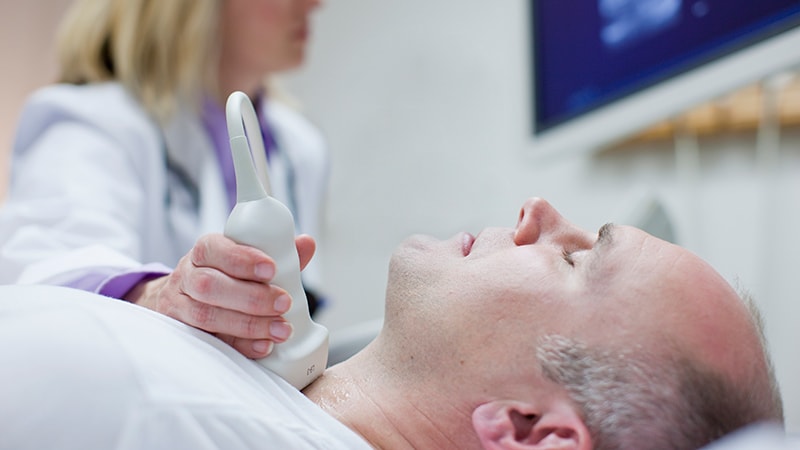Amid ongoing debate over potential adverse effects of radioactive iodine (RAI) in the treatment of hyperthyroidism, a new meta-analysis shows no significant increase in the risk of cancer or cancer mortality in the vast majority of cases, with an increased dose-response risk with higher doses shown in some studies.
“These findings suggest that radiation-induced cancer risks following RAI therapy for hyperthyroidism are small and, in observational studies, may only be detectable at higher levels of administered dose,” report the authors of the analysis, published Sept. 27 in JAMA Network Open.
In a commentary published along with the study, Bernadette Biondi, MD, noted that, despite some limitations, “the current analysis from recent literature studies is reassuring on the potential negative effects of RAI”.
“These data can help reduce anxiety in both patients and clinicians as to the risk of cancer after RAI.”
Martin A. Walter, MD, agreed. “When including nearly a half-million patients into the analysis, there is no significant increase of risk for secondary cancers after radioiodine therapy for hyperthyroidism,” Walter, who was a coauthor on the American Thyroid Association’s guidelines for the diagnosis and management of hyperthyroidism (Thyroid. 2016 Oct;26:1343-421), told this news organization.
“For me, this paper is rather reassuring of the safety of the therapy,” he added.
Though used in the treatment of hyperthyroidism for more than 7 decades, the frequent use of RAI continues to generate concern of potential carcinogenic effects, with some previous studies linking the treatment with subsequent malignant neoplasms, while others have shown no risk.
However, the potential role of a dose-response effect on the cancer risk has not been well explored, the authors note.
For their meta-analysis, Sung Ryul Shim, PhD, of the department of preventive medicine, Korea University, Seoul, South Korea, and colleagues identified 12 studies including 479,452 participants that involved evaluation of cancer incidence and mortality with exposure versus nonexposure to RAI therapy for hyperthyroidism.
Overall, the results showed no significant difference in the pooled cancer incidence ratio between those who were and were not exposed to RAI therapy (incidence ratio, 1.02), and there also were no significant differences in mortality (IR, 0.98).
There were no increases in the risk of any specific cancers with the exception of thyroid cancer, which had a higher incidence among those with RAI treatment (1.86), and more than twice the risk of mortality (2.22).
Two studies did report a linear dose-response association between RAI for hyperthyroidism and breast cancer mortality (1.35 per 370 MBq; P = .03) and solid cancer mortality (1.14 per 370 MBq; P = .01).
Among them was a 2019 study, using data on nearly 19,000 patients from the multicenter Cooperative Thyrotoxicosis Therapy Follow-up Study, showing a dose-response effect on solid-cancer mortality that the study authors described as “modest.”
“For every 1,000 patients with hyperthyroidism receiving typical doses to the stomach (150-250 mGy), an estimated lifetime excess of 19-32 solid cancer deaths could occur,” the study concluded.
Caveats surrounding the issue include that hyperthyroidism itself has been associated with an increased risk of cancer, suggesting a potential role of an excess of thyroid hormone excess on cancer risk.
“The underlying conditions of the thyroid gland could be another possible reason for the increased risk of malignant thyroid tumor after RAI for hyperthyroidism,” the investigators of the current study write.
“Thyroid-stimulating hormone and thyroid-stimulating antibodies, present in Graves disease, may play a role in carcinogenesis and tumoral growth, and hyperthyroidism is associated with a high incidence of thyroid carcinoma,” they add.
Tumors developing from hyperthyroid tissue show aggressive behavior, they add, and note that an increased overall risk of cancer and greater cancer mortality has been also reported with the alternative of antithyroid drug therapy when compared with RAI.
Nevertheless, considering the dose-response risk observed in the two studies, the authors and Bondi agree that more rigorous studies are needed to investigate the issue.
“The limited quality of the evidence in the literature on the adverse effects of RAI underlines the need for future randomized clinical trials in this area,” writes Bondi, of the department of clinical medicine and surgery, University of Naples (Italy) Federico II, in her editorial.
In further commenting, Walter, of the department of nuclear medicine, University Hospital, University of Geneva, agreed that the benefits of treatment need to be weighed against the risks.
“There is always caution used when deciding for a medical therapy, including radioiodine therapy,” he added. “It has to be emphasized though, that poorly controlled hyperthyroidism is a serious condition that, for instance, can lead to arrhythmia, and that in elderly patients is associated with increased mortality,” Dr, Walter cautioned.
“Statistically significant does not always mean clinically relevant, and the benefits clearly outweigh the risks.”
The authors, Bondi, and Walter had no disclosures to report.
This article originally appeared on MDedge.com, part of the Medscape Professional Network.

